November to Remember: Shakespeare in Love seamlessly blends fantasy and reality to give a sensational insight into the Bard’s life
Shakespeare in Love is all about a fanciful deep dive into the Bard's elusive life, his eccentric drive to become the best and his arduous yet beautiful journey towards the grand development of Romeo and Juliet.
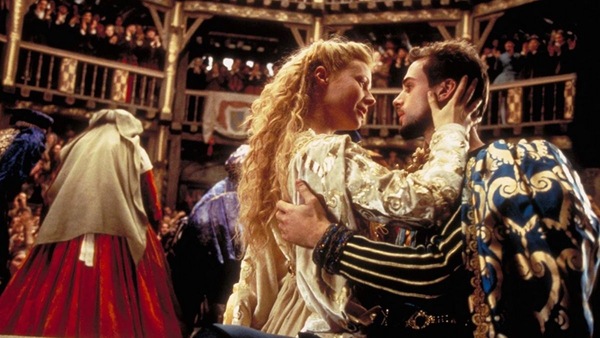
Last Updated: 08.28 PM, Nov 03, 2021
On December 11, 1998, Miramax released Shakespeare in Love to a limited audience. The romantic comedy went on to bag seven Oscars at the 71st Academy Awards ceremony. It received worldwide critical acclaim and was a box-office success. William Shakespeare is a biographer's nightmare. Not because the information about the Bard’s life is so overwhelmingly scarce, but also because it is difficult to examine most of its veracity. John Madden's Shakespeare in Love tinkers with art, history, and the love-life of the world’s greatest playwright. The film effortlessly fuses elements of sly wit, exuberant energy, and surprising sweetness into a heady concoction that appeals to all hopeless romantics. Though the concept sounded simple on the surface, the film could have gone wrong in many ways. Fortunately, for Madden, Shakespeare’s elusive life presented chunks of unknown years (at least in historical records) that the filmmaker could paint in his own artistic fantasies, taking ample cinematic liberties. And thus was born a tempestuous romance with the proverbial ‘heroine’, an androgynous Thomas Kent, who was Lady Viola de Lesseps (played by Gwyneth Paltrow) in disguise.
To establish the times, Madden dives straight into the vibrant milieu of intimate theatre settings of London in 1593. As the world of theatre struggles to gain respect, the upcoming Will Shakespeare (played by Joseph Fiennes) is disastrously struck by the plague of writer’s block. He is unable to realise his latest comedy Romeo and Ethel, The Pirate’s Daughter. To add insult to injury, the theatre in London is on the verge of permanent closure. Madden generously explores the stage culture by populating his opening frames with congested theatre buildings, packed with the expected lot of riff-raffs and a few middle-class workers there having a good time (watching plays at theatres was considered too lewd for the respectable, at the time). Not only in terms of set designs, but Madden’s world takes an incisive glance into the inner workings of stage crews, their budgets, script deadlines, and even casting processes. His lens is so detailed, it’s almost akin to a cinematic survey that reminds us that theatre was as much a business as an art form. Meanwhile, Shakespeare struggles to meet theatre deadlines and dolefully complains to his therapist that his quill is broken.
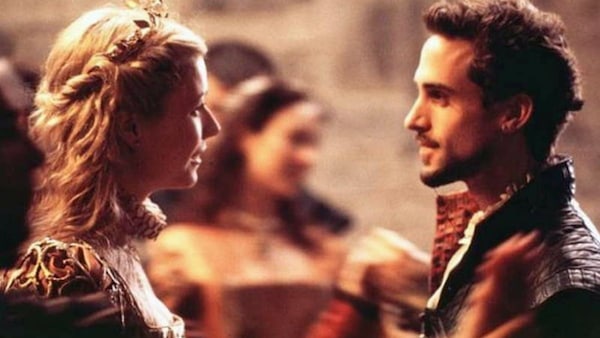
Set in late Elizabethan England, Shakespeare in Love establishes at the onset that the playwright is not as successful as his contemporary Christopher Marlowe (played by Rupert Everett). In a sequence, a boatman is seen bragging about the time when he had ferried Marlowe across River Thames. But Shakespeare is a rising star, the voice of the youth, a maverick who refuses to listen, and in demand by the penniless owner of Rose Theatre, Henslowe (played by Geoffrey Rush). The Bard’s sparse but impactful popularity is such that Richard Burbage (played by Martin Clunes), the owner of Curtain Theatre (that already patronises Marlowe) also vies for the talented Shakespeare’s attention.
Marlowe is presented as a master playwright who is widely considered the greatest dramatist of the era. Despite their professional rivalries, the two contemporaries are on speaking terms. Marlowe even provides valuable inputs to Shakespeare’s upcoming play to help him get through the creative block.
Parallel to the Marlowe-Shakespeare feud narrative runs another more gripping one, between the theatre-loving noblewoman, Viola and the smitten Shakespeare. But, their journey towards true love never runs smooth and their courtship is fraught with mishaps and bad timing.
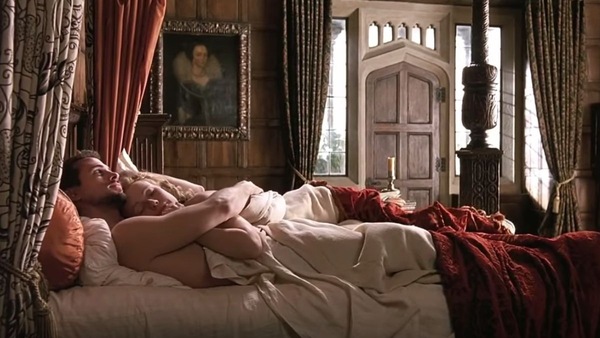
Through their tumultuous affair, Madden continuously forces viewers to ask questions like — What does it take to renew a man’s energy and inspire his mind? Or is love enough for the truly gifted to achieve success? Viola, a wealthy nobleman’s daughter, is enamoured by Shakespeare’s abandon and wishes to step into his world of eccentricity. This propels her to take desperate measures and build the persona of Thomas Kent, a veneer that enables her to pursue her passion in acting as well as be close to her beloved. Even though Shakespeare meets Viola at a royal ball much later and instantly falls in love, Kent’s earnestness on stage also moves the playwright considerably.
The duo’s ill-fated love story is surrounded by a series of subplots. Stuck-up nobleman and buffoon Lord Wessex (played by Colin Firth) willingly trades his title for Viola's hand in marriage. That night, Shakespeare sneaks into the party celebrating Viola’s engagement to the odious Lord. But when Wessex notices the obvious attraction between Shakespeare and Viola, he threatens Shakespeare with dire consequences. Shakespeare promptly identifies himself as Christopher Marlowe before fleeing the party. (A probable explanation for Marlowe's mysterious murder at Deptford). The threads of the multi-faceted story come together neatly on the day of Viola's wedding. Meanwhile, Shakespeare rediscovers his chi and finishes the play, settling to name it Romeo and Juliet.
The film captures the fecund imagination of all romantics who dare to overcome the barriers of wealth, titles, and class in pursuit of what they desire. So well-founded are Madden’s aesthetics, that Shakespeare in Love transforms into something much more than a mere love story. Healthy doses of juicy court intrigue, backstage politics, and poignant moments from Romeo and Juliet satiates the viewers’ cinematic appetite. The script’s biting satire, courtesy of Tom Stoppard's comic prowess, imaginatively unfolds a witty, sensual, and timeless tale behind the creation of the greatest love story ever told. The devilishly humorous penmanship is actualised by subverting historical facts to suit the film’s purpose. The mischievous wordplay between Will and Viola creates an air of playful sexual tension. It helps that Paltrow has never looked more radiant or acted so impeccably.
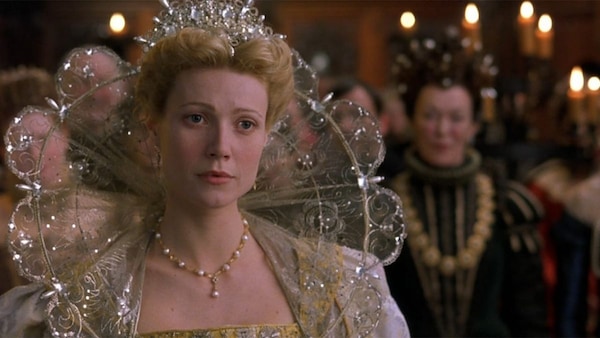
The widespread appeal of Shakespeare in Love lies in the frantic entertainment that it evokes rather than its historical accuracy. Throughout its runtime, the film portrays many events that are far from being plausible. Viola’s betrothal, Wessex’s claims of owning tobacco plantations in America more than a decade before Virginia would host the establishment of Jamestown, or even the atrociousness of Queen Elizabeth I (played by Judi Dench) gracing the halls of a London theatre — are all outrageous, but deliciously sensational for anyone to ignore. Finally, the rather interesting addition of Shakespeare having a counsellor who times his therapy appointments in grains of sand is nothing short of creative genius. The film also acknowledges the conspiracy theories suggesting Shakespeare did not pen the plays credited to him. A meeting with Marlowe in a local tavern to discuss Romeo and Juliet is a sly reference to the rumour.
Shakespeare in Love is punctuated by various themes like sexual liberation, feminism, artistic freedom, the nobility of acting, and the power of theatre. The film involves two epic rivalries, some pretentious lovemaking scenes, cross-dressing, and a genuine depiction of Elizabethan life. At some point, the film even attempts to solve the mysterious murder of Marlowe. But throughout this bumpy ride, it’s never an overkill. The stirring background score sneaks in at all the right junctures. Subtler still is the parody of pompous Hollywood actors and their world revolving around grabbing bogus percentages.
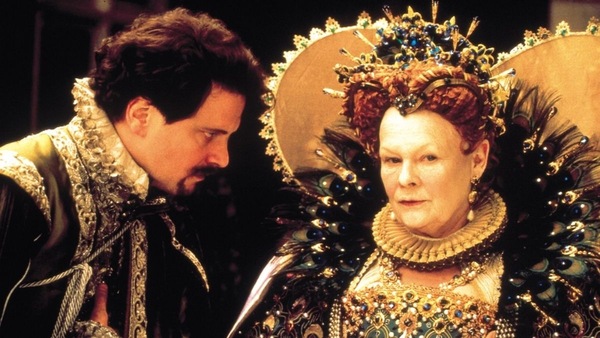
In a little more than two hours, John Madden, Marc Norman, Tom Stoppard, and the ensemble of stellar actors manage to produce an enthralling product that demands praise. They skillfully create a hypothetical timeline that depicts the soaring romance of the world’s most famous playwright and author. Shakespeare in Love showcases the genesis and evolution of Romeo and Juliet, the immortal tragedy. The addition of contemporary humour to the mix does not alienate the lavish production, but instead adds to the charm, making it a calculated and well-balanced blend of the old and the new.
